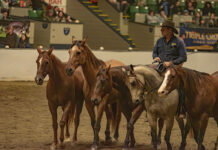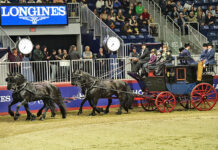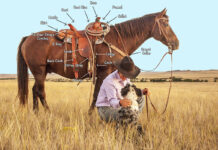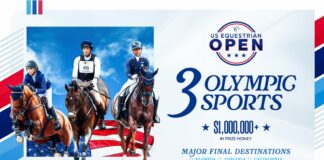Tap the arrows on the image above to scroll through the slideshow.
Of the three Olympic equestrian sports, show jumping enjoys the most widespread popularity. More countries send athletes for jumping than for dressage or eventing. It’s the only one that is completely objective—competitors are tasked with clearing the fences and staying within the time and that’s it. There’s no inscrutable dressage judging to leave spectators scratching their heads.
These reasons might also be why, for U.S. viewers, show jumping is the only one of the three disciplines to get the coveted honor of network TV coverage. Much of the show jumping is scheduled to air not just on TV, but on the NBC network rather than one of its cable partners (find out more about the broadcast schedule here.)
The U.S. has historically done quite well in the show jumping. The team won gold in 2008 and 2004 and silver in 1996. Chris Kappler and Royal Kaliber brought home an individual silver in 2004 and Beezie Madden and Authentic took bronze in 2008. This year’s team, which includes Olympic veterans Madden and McLain Ward, is tasked with bringing the U.S. back to the podium after a disappointing finish in London in 2012.
Today’s individual jumping qualifier was a preliminary round that narrows the field of 75 riders down a bit to determine who will compete for individual medals. At the end of the day, horse-and-rider pairs who finished with eight faults or fewer qualified to go on to the next round. However, riders who are part of a team will continue in the team effort even if they didn’t make today’s individual cutoff.
Kent Farrington was the trailblazer for the U.S. team in today’s competition with Voyeur, and the pair took their job seriously, turning in only the second double clear round of the day.
Lucy Davis and Barron were next and it looked like they might join the double clear ranks as well until the very last jump of the course. Although dropping a rail on the big oxer was disappointing, four faults was still good enough to allow Davis to qualify for the next round.
McLain Ward is no stranger to the Olympics, but his horse, Azur, made her debut today. It was another four fault round for the Americans after a dropped back rail on the oxer of a combination that had been causing quite a bit of trouble for riders throughout the day.
With two team golds and an individual bronze in her collection of Olympic hardware, Beezie Madden arguably the most successful rider on this year’s U.S. team. She’s in Rio with her bronze-medal partner from the 2014 World Equestrian Games, Cortes C. Madden rode a solid, aggressive round on the big Belgian Warmblood, but a very unlucky rub on the first of two walls took down a brick for four faults.
All #TeamUSA athletes have qualified for the next phase of individual jumping competition at #Rio2016! pic.twitter.com/ysfHF0DPkd
— USEF (@USEquestrian) August 14, 2016
In individual competition, each rider carriers their faults from one round to the next, so while all four American riders will progress to the next round, Farrington stands as the best individual hope for a medal. But it won’t be easy; 24 riders went double clear today. Among those with zero faults is reigning Olympic gold medalist Steve Guerdat of Switzerland who is here again with his 2012 mount, Nino Des Buissonnets. Canada’s Eric Lamaze, gold medalist in 2008 with the legendary Hickstead, was also double clear today with Fine Lady 5, as was Canadian teammate Amy Millar, daughter of 10-time Olympian Ian Miller.
In the team competition, the faults from this round won’t carry over, which means a fresh start for everyone when the first round of team jumping takes place on Tuesday, August 16.
Equestrian competition resumes tomorrow, August 15, with the Dressage Individual Grand Prix Freestyle beginning at 9:00 a.m. ET.





